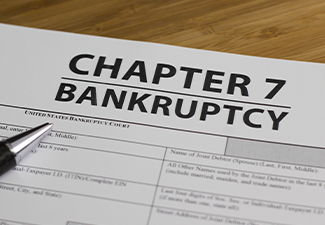Common Bankruptcy Myths
Nov. 8, 2021
 In 2020, a total of 26,723 Texans filed for bankruptcy. The majority of the filings were for Chapter 7 liquidation (15,798). Most of the others were filed for a Chapter 13 repayment plan (9,069). The remainder involved Chapter 11, which is for businesses and high-income individuals.
In 2020, a total of 26,723 Texans filed for bankruptcy. The majority of the filings were for Chapter 7 liquidation (15,798). Most of the others were filed for a Chapter 13 repayment plan (9,069). The remainder involved Chapter 11, which is for businesses and high-income individuals.
While the prospect of bankruptcy leaves a bad taste in most people’s mouths – equating it with both failure and the loss of everything you’ve worked for – it's actually a perfectly legal and practical option when your debts are overwhelming you. It provides a fresh start, not only financially but emotionally.
If you’re underwater in a sea of debt with collection calls, texts, and emails arriving virtually daily, and you’re located in or around Amarillo, Texas, contact me at Swindell Law Firm. I will assess your situation and guide you along the proper course of bankruptcy protection to get you the fresh start you deserve.
Bankruptcy Myths
Even among those who are seriously considering bankruptcy, myths abound. Before filing for bankruptcy, it’s important to understand what it does accomplish and what it cannot accomplish. Here are some of the most common myths and why they are false:
I will lose everything if I file for bankruptcy: Not only are a lot of your assets exempted from bankruptcy sale under a Chapter 7 liquidation filing, Chapter 13 allows you to retain virtually everything so long as you honor your repayment plan. Texas has generous exemptions under Chapter 7. For instance, you can exempt virtually all equity in your primary home, and you can exempt one car per licensed household driver, though it must fit into the household personal property exemption (either $50,000 if single or $100,000 if married).
My credit will be ruined forever, and I can never qualify for a loan again: It’s true that a bankruptcy will appear on your credit report for years after your discharge (normally seven to ten years). However, your credit score will usually improve after you finish bankruptcy. The Federal Reserve Board of Philadelphia issued a report showing that the average credit score of a Chapter 7 filer was 538.2 before bankruptcy (on Equifax’s scale of 280 to 850) and 620 after.
My bankruptcy will relieve me of all of my debts: If all you have are medical bills and consumer credit debt that is unsecured, this may be true. There are some debts that can never be discharged, however. For instance, child and spousal support payments must be maintained, and most student debt cannot be forgiven. Uncle Sam will also likely hold your feet to the fire for any unpaid taxes (although some income tax debt is dischargeable). Debts arising from fraud you committed cannot be discharged either.
My spouse and I both have to file: This depends on whose name the debt resides in. If one spouse has run up huge consumer debt that has not been signed onto by the other spouse – and there are no joint obligations being discharged, such as a primary residence – then only the spouse with the debt generally needs to file. However, if both spouses share debts that are being discharged and only one spouse files, creditors can go after the non-filing spouse for the debt even if the filing spouse is discharged.
You can run up your debts on a spending spree right before filing: Bankruptcy courts generally look askance at filers who go on spending sprees right before filing. Often, they will not recognize debts incurred 90 days before filing if they’re not for necessities or emergencies. Sometimes, they may even look upon your little spree as fraud. In short, it’s not a good idea to frivolously run up debts right before filing.
You can only file once for bankruptcy: Not true, but there are some limitations. If you’ve filed for Chapter 7, you will have to wait eight years before filing again under the same chapter. On a Chapter 13 plan, you can technically refile every two years, but practically speaking, you’d have to finish your current repayment plan first.
Paying off your debts is always a better option: If you can afford to pay your debts and still maintain a functional lifestyle, you probably don’t need to consider bankruptcy in the first place, but if you’re juggling payments and paying just the minimum amounts (or less), there’s a good chance that you should consider at least a Chapter 7 reorganization/repayment plan. If your debts total more than 50 percent of your annual income and you can’t keep up, bankruptcy is probably your best option. Consult with a bankruptcy attorney to weigh your options.
Getting Help from an Experienced Bankruptcy Attorney
If you’re overwhelmed with debt, leave aside your preconceived notions about bankruptcy and contact me at Swindell Law Firm immediately. Going through bankruptcy can be a trying experience, so don’t consider doing it alone. I’ll stand by your side throughout the process and see you through to a successful conclusion.
Swindell Law Firm proudly serves clients in Amarillo and across the Texas panhandle, including Borger, Pampa, Hereford, and Dumas.
